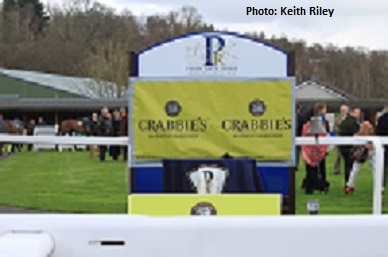Fallout From Betting Turnover Decline
 Fallout From Betting Turnover Decline
Fallout From Betting Turnover DeclineThe fallout from betting turnover for the future of horse racing in Britain could have serious consequences for the industry.
The British horse racing industry is confronting a critical financial challenge, with online betting turnover plummeting by £3 billion over two years—a staggering 25% decline that threatens the sport's economic foundations.
"We're looking at a potential systemic collapse of the racing ecosystem," warns John Thompson, veteran racing industry consultant. "This isn't just about numbers—it's about the survival of an entire sporting heritage."
So what has brought about this reversal of fortunes for horse racing and gambling generally?
There are several reasons for this, but chief among them is the impact of affordability checks legislation, recently introduced by the government.
Now, I've written previously about the creeping interference by well-meaning parties but the fact is - should the welfare of the few members of the public who have serious gambling problems affect the entertainment and (more pertinently) the livelihoods of the vast numbers of people involved in British horse racing?
Let's just pause for a moment before we're accused of getting our knickers in a twist and lay out the hard facts of the case and why they need addressing.
Reduced Prize Money and Financial Strain
One of the most immediate consequences of this downturn is a reduction in prize money. With less betting revenue flowing into the industry, race purses will inevitably shrink. This will have a direct impact on trainers, jockeys, and owners, who rely on prize money to sustain their livelihoods.
Racecourses are also feeling the strain. Lower betting turnover translates to decreased income, making it difficult to maintain facilities, host events, and attract top-quality racing. Some smaller or struggling venues may even face closure.
"Racecourses are facing significant financial challenges. We must cut costs while investing in the fan experience to maintain our position in the market." was the opinion of a leading racecourse executive.
 Dressing up for Ladies Day at Chester Racecourse
Dressing up for Ladies Day at Chester RacecourseJob Losses and Decreased Investment
The financial crisis could lead to significant job losses across the industry. Trainers, jockeys, stable staff, and racecourse employees may find themselves out of work as organizations tighten their belts.
- A leading trainer said: "The decline in betting revenue is a major concern for the entire industry. We need to find ways to attract new fans and bettors to secure the future of horse racing."
Moreover, the decline in betting revenue will likely result in decreased investment in breeding programs, horse care, and overall industry development. This could hinder the long-term growth and competitiveness of British racing.
Horse Welfare and Sponsorship Concerns
 Jockey and Trainer
Jockey and TrainerThe financial downturn could also impact initiatives focused on horse welfare.
A spokesman for a well known horse welfare organization said: "Reduced funding could have a devastating impact on horse welfare. We need to ensure that horses continue to receive the care they deserve."
Reduced funding may limit the resources available for veterinary care, rehabilitation, and retirement programs.
Sponsorship opportunities may also diminish as companies become more cautious about investing in a sport that is facing challenges. This could further exacerbate the industry's financial woes.

Industry Consolidation and Innovation
To survive the crisis, some businesses may resort to consolidation, merging or acquiring smaller operations. This could lead to a more concentrated industry with fewer players.
The industry will need to innovate and find new ways to attract bettors and spectators. This may involve exploring new betting products, enhancing the fan experience, and leveraging technology to reach a wider audience.
Potential Government Intervention
If the situation worsens, there may be calls for government intervention. This could take the form of tax breaks, subsidies, or regulatory changes aimed at supporting the industry.
It might also give them pause in rushing through new rules regarding affordability checks and who they should apply to.
Some of the potential unintended consequences include:
Migration to offshore, less regulated platforms
Underground gambling market expansion
Reduced tax revenues for regulated markets
If the likes of horse owners John Magnier and Godolphin realise their return for investing in the industry is declining, there may come a point when they decide to call it a day.
A Broader Economic Impact
The financial crisis in British racing could have a ripple effect on the broader economy. Horse racing is a significant employer and contributes to local economies, particularly in rural areas. Job losses and reduced spending within the industry could have negative consequences for businesses and communities.
The future of British racing hangs in the balance. The industry must adapt to the changing landscape and find innovative solutions to ensure its long-term sustainability.
The UK horse racing industry has a world-renowned reputation; for example the Grand National is watched by millions worldwide and can generate substantial betting turnover and transmission revenue.
Fallout From Betting Turnover Decline Conclusions
As the gambling industry tries to find a way through the increasingly complex landscape of the latest rules and regulations, success will hinge on strategic adaptation, technological innovation, and a genuine commitment to responsible gambling practices.
The path forward requires a delicate balance between maintaining consumer freedom, protecting vulnerable individuals, and ensuring the economic viability of gambling enterprises.
While affordability checks present significant challenges, they also offer an opportunity for the industry to rebuild trust, demonstrate social responsibility, and develop more sustainable business models that prioritize long-term customer well-being over short-term gains.
The most successful operators will be those who view these regulatory changes not as obstacles, but as a catalyst for meaningful industry evolution.
Back to Grand National from Fallout From Betting Turnover Decline
The Popular Daily Lay Tips UK/IRE £5 per month
Subscribe Below
French Lay Racing Tips for £5 per month
Subscribe below


Returns Policy: Once a customer has agreed to pay for a product or service no returns will be permitted or payments returned.
All PayPal transactions are subject to the PayPal Privacy Policy
Privacy Policy: Personal details provided to this site by an individual may be shared with third parties unless requested otherwise.
Above policies updated 15 March 2018



